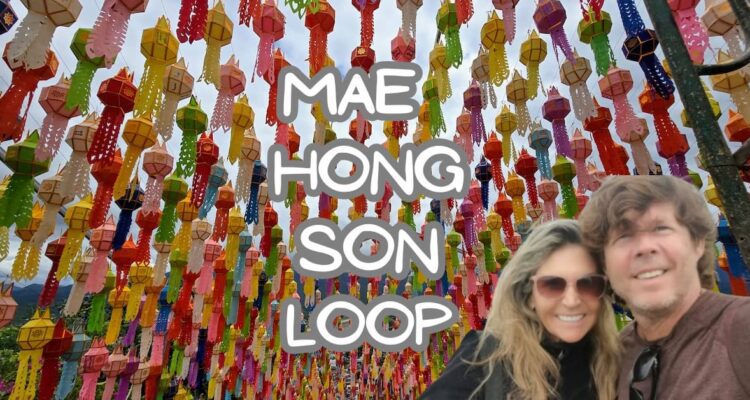For us, the Mae Hong Son loop has always been this mythical road trip that has been a goal for a few decades. In the past it was difficult to drag me away from Chiang Mai. This time we set aside seven days for the Mae Hong Son Loop and quickly realized it deserved far more of our time – weeks, even!
The Mae Hong Son loop is one of Thailand’s most scenic and thrilling road trips, offering travelers a journey through stunning mountain landscapes, charming villages, ancient temples, and lush forests. Starting and ending in Chiang Mai, this curvy loop covers about 600 kilometers and features more than it’s infamous 1864 hairpin turns and countless opportunities for exploration and adventure.
Here’s a detailed guide on how to travel the Mae Hong Son Loop by car, including where to stop, what to do, and where to sleep and eat along the way.
Mae Hong Son Loop Map
Above is our Mae Hong Son Loop Map along with our favorite attractions in each spot, restaurants and eateries. We highly recommend doing the Mae Hong Son loop by car. Why? Well, we have seen what the 1864 plus hairpin turns have done to inexperienced riders attempting the loop on scooters and motorcycles.
Don’t get us wrong, if you are an experienced rider, then by all means enjoy each hairpin turn of the ride. However, if you are just attempting to do this with limited experience then please reconsider. Rob had to help quite a few folks trying to figure out if their scooter was still road worthy after a spill. We also saw many people seriously injured.
Therefore we highly recommend doing the Mae Hong son loop by car. Another option is a Mae Hong son loop tour which will take you to different areas close to Chiang Mai and Pai. If you are interested in a Mae Hong Son loop tour – friends have recommended this 5 day 4 night Mae Hong Son Loop Tour.
Which Direction is best for the Mae Hong Son Loop?
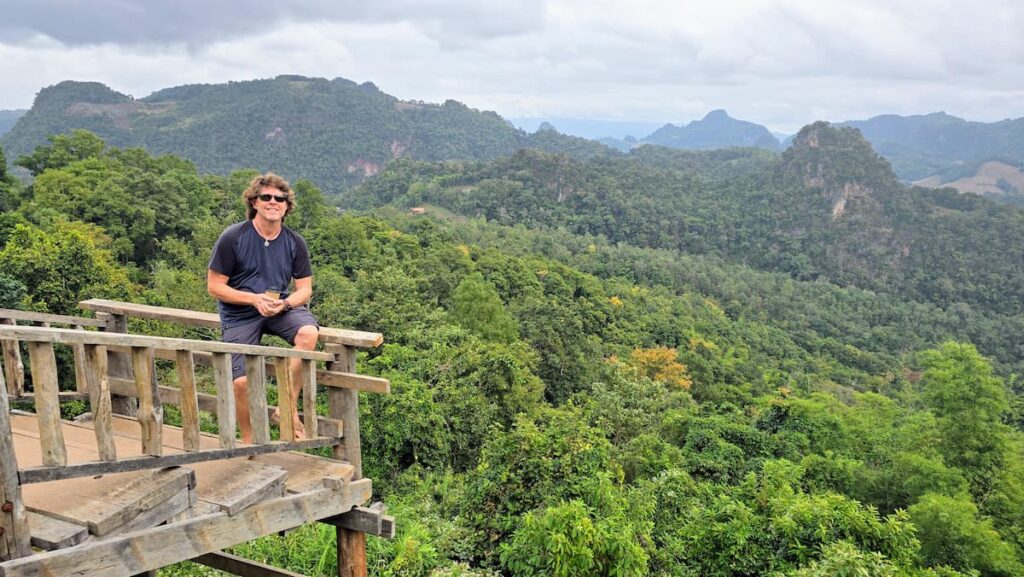
This has been debated so much – do you do the Mae Hong Son Loop clockwise or counter clockwise? Well, if you are driving then it doesn’t really matter. We decided to do the Mae Hong Son loop by car counter clockwise.
However, if you are riding, then it is recommended to start off easier by going clock wise and build up to the crazier hairpins which intensify at the half way point. Don’t get us wrong, there are still quite a few curves and switchbacks before the half way, however they are not as difficult as the ones that come later.
When is the best time to drive the Mae Hong Son Loop?
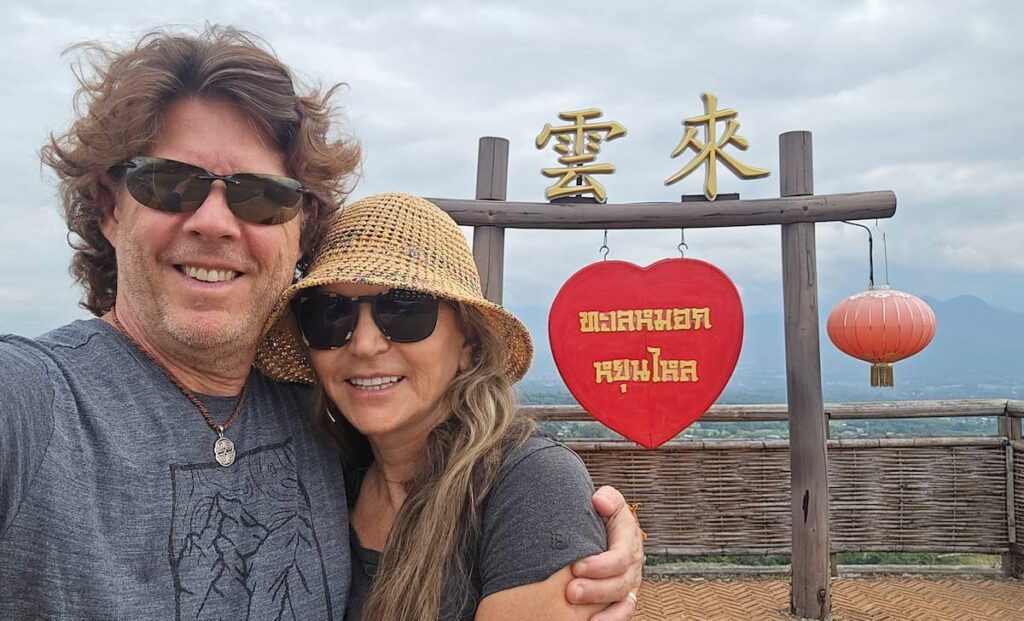
The best time to drive the Mae Hong Son Loop is from around mid November to January. The air is cooler and it is the dry season. In addition, from around February until the rainy season, fields get burned in Northern Thailand making the air quite polluted. Mix the smog with the heat of the summer makes the air unpleasant to breathe.
Therefore stick to the mid-November to January time frame and you should be safe, dry and breathing in fresh air!
Please note that if you would like to see the Mexican sunflowers fields, then your window is even shorter and you should do the Mae Hong Loop between the end of November to the beginning of December as they only bloom during this time.
Where to Rent a Car
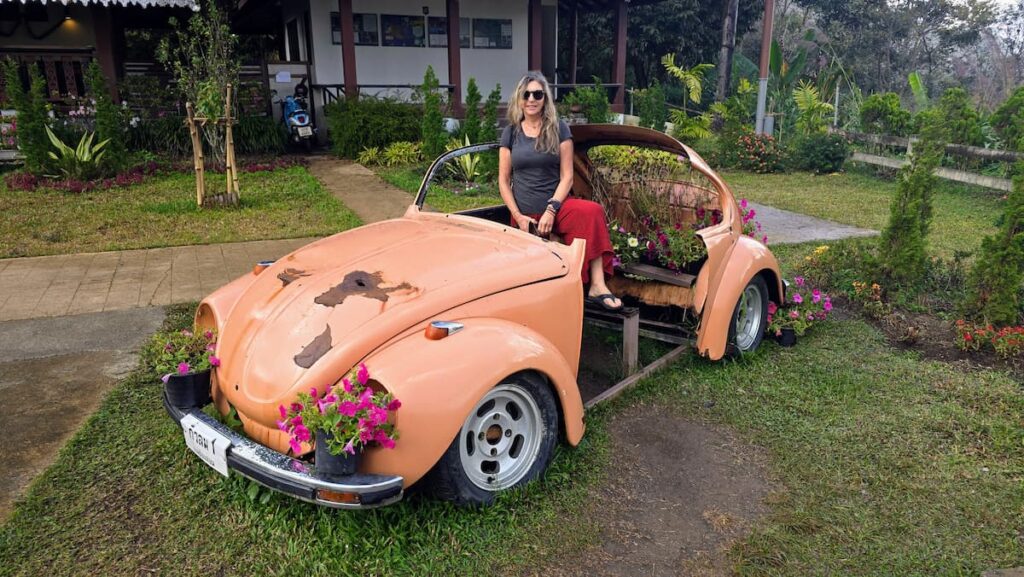
There are plenty of rental car agencies at the Chiang Mai International Airport (CNX). We searched through booking.com and kayak.com and ended up with a nice 4 door through the Thai Rental Car agency.
These guys gave us full insurance (including third party) as part of the price, were friendly and no hassle. Even though we usually hate car insurance interactions, we had no problems with this company and therefore can wholeheartedly recommend them.
Mae Hong Son Loop by Car Itinerary
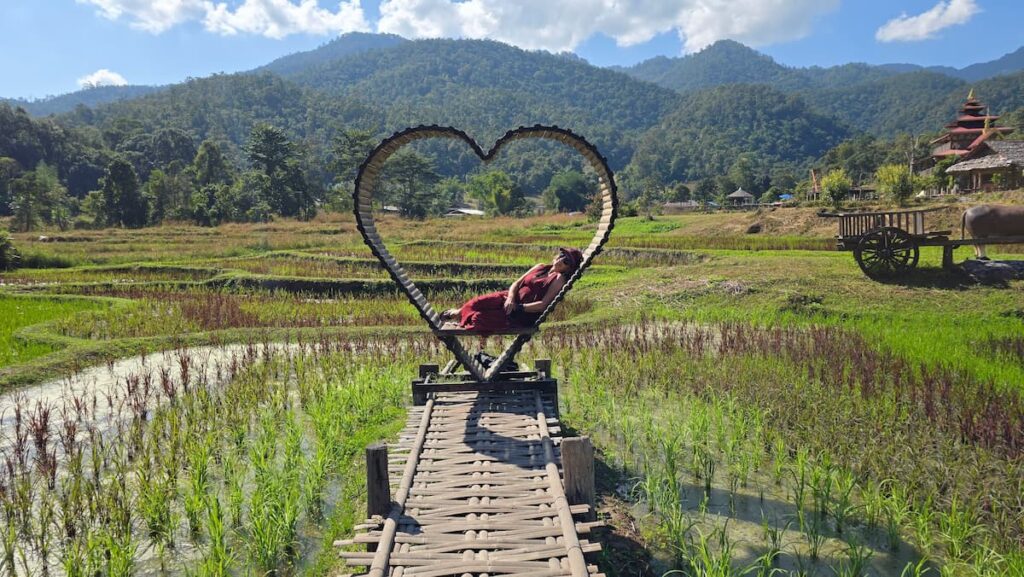
As we have mentioned above, we would highly recommend spending at least a week on the Mae Hong Son loop. There is just so much to see and do! However, we do understand that folks don’t always have the luxury of this much time dedicated to just the loop.
Therefore, in this Mae Hong Son Loop itinerary we are providing the minimal amount of time that we would recommend spending at each place. If you have extra time then add it to Pai and stay awhile enjoying this charming town and all it has to offer in it and it’s surroundings.
There are so many opportunities for hiking along this loop. So if you enjoy trekking through lush jungle or mountainous trails, then consider spending a few days or more in the Doi Inthanon National Park. In addition, the Mae Yen Waterfall trail is a 17 km (10.5 mile) out and back trail near Pai that is a fun excursion (although we do recommend taking a guide along).
Day 1: Chiang Mai to Pai (133 km)
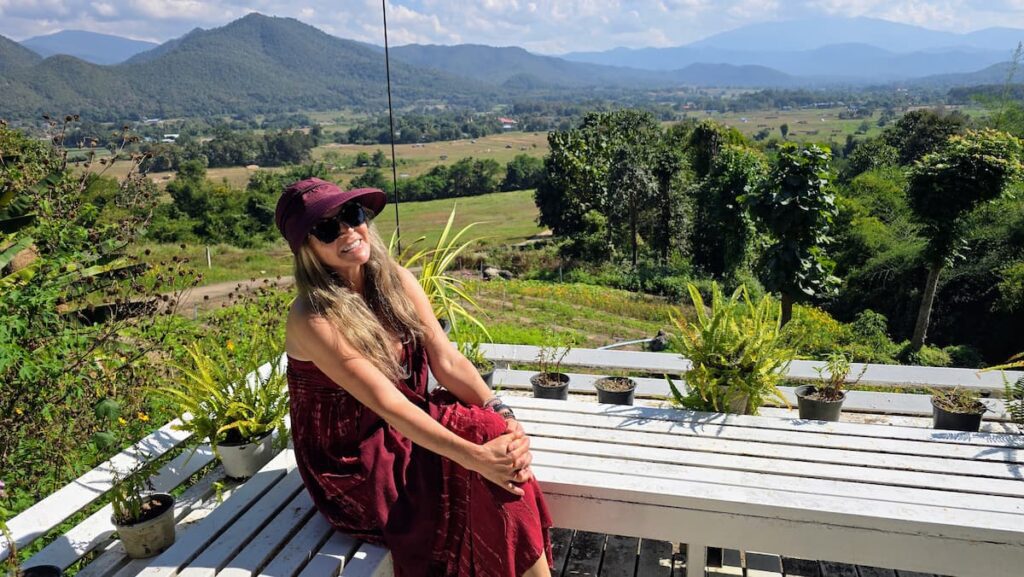
The drive from Chiang Mai to Pai is very windy. Be prepared for 762 hairpin turns that will make the most stable stomach queasy. However the scenery is beautiful with lush jungle gyrating through mountains and farmlands.
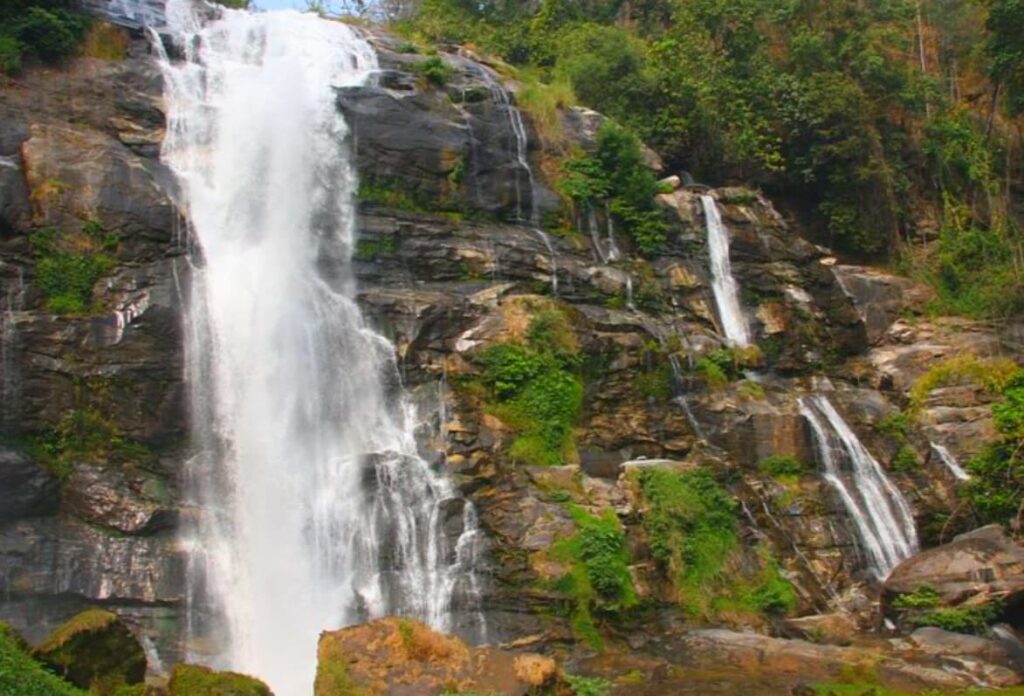
If you want to take a break, we recommend stopping at the Mok Fa Waterfall where you can stretch your legs and breathe in the fresh air to combat the queasiness. There is also an option to go for a swim in the pool beneath the falls. The price to get in is 100 Baht per person and 30 Baht for the car park or 10 Baht for the scooter.
Another good stop is at the Pong Dueat Geyser, which is a hot spring where you can swim in one of the pools. It is actually the biggest and highest hot spring in all of Thailand! They may or may not ask you to pay the 300 Baht entrance fee (about $9 USD) which will also get you into the Pai Hot Springs and the Huai Nam Dang National Park (on the same day).
As you approach Pai, make a stop at the Ta-Pai Memorial Bridge to take a few photos on this rustic historical monument. The Pai River rushes below and the bridge makes a nice frame for the Pai landscape behind it.
The drive without much traffic and without the stops should take you about 4-5 hours.
Day 2 & 3: Pai
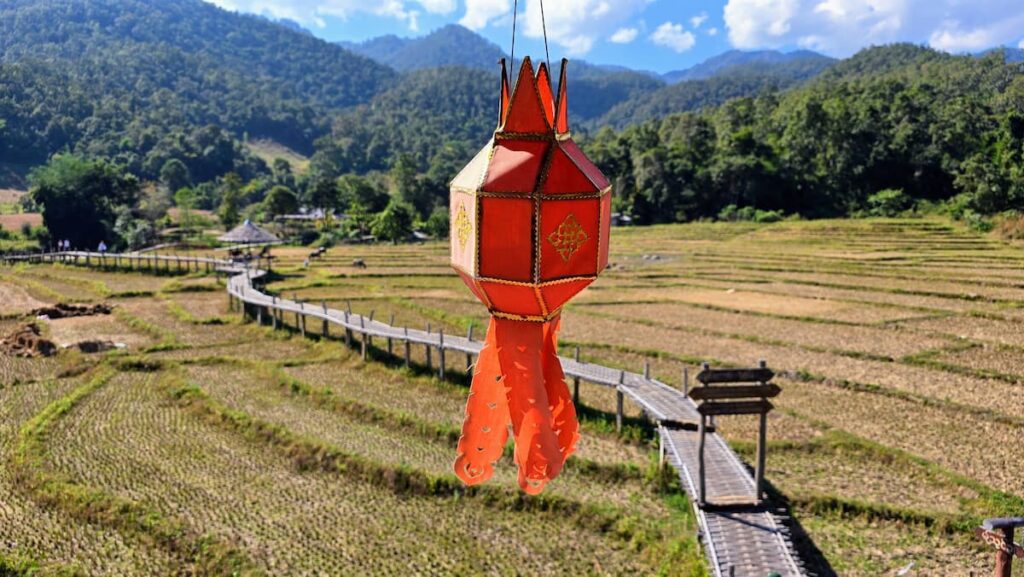
Pai is one of those towns that has a reputation for being overrun by foreigners, that is true. However in our minds it still has the Thai charm, a lovely bohemian vibe and is every little bit worth the time. We stayed for 2 nights and really wanted to stay much longer.
Top Things to Do in Pai
There are so many things to do in and around Pai! Here are some of our favorites. Keep in mind that to do all of these will require 2-3 full days.
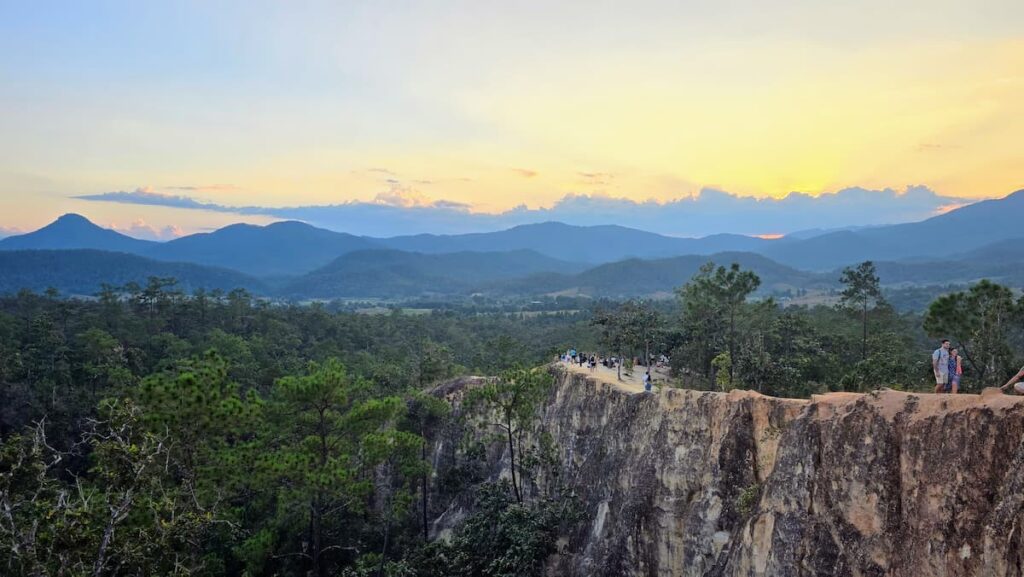
Pai Canyon is a wonderful place to go for a hike especially at sunrise or sunset. There are many kilometers of trails. However, beware that the thin track is quite precarious and you need to have good traction on your shoes not to slide around or tumble down the thin sandy dune trails.
If you plan to hike, bring enough water and snacks with you.
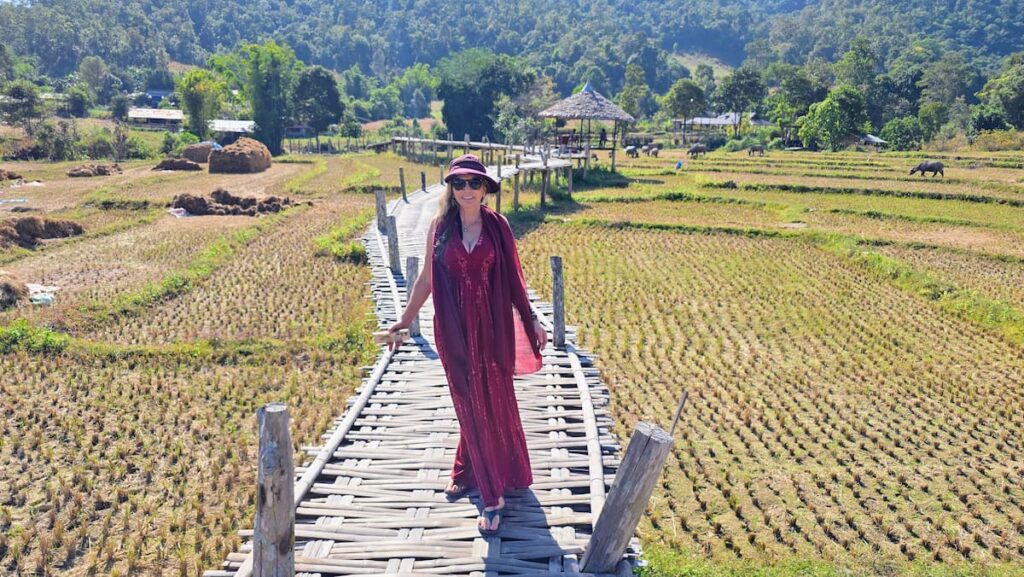
Bamboo Bridge (Kho Ku So Bridge) this was one of our absolute favorite places in Pai! It is a bit of a drive up a windy thin road but well worth it! An 800 meter bamboo walkway meanders over rice fields and babbling brooks that take you into a peaceful Buddhist monastery where the monks live and pray.
There is a restaurant near the parking entrance called Jaey Cafe that makes delicious Thai food. Make sure to budget at least an hour for this experience without lunch. The cost is 30 Baht (0.85 USD).
Wat Phra That Mae Yen is the huge white Buddha up on the mountain that one sees from every vantage point in Pai. 353 steps up will take you to the panoramic view of Pai and the large white Buddha itself.
Take note that if you Google white Buddha, it will take you to another statue in the valley – not this one.
Mae Yen Waterfall Hike is a 16.5 km (10.5 mile) out and back hike which takes you to a beautiful waterfall through rice fields and villages while crossing the river back and forth. Water shoes are highly recommended as well as snacks.
This hike will take approximately 2.5 – 3 hours to climb the 740 meter elevation while crossing the river 40 plus times. The way back is 2 – 2.5 hours. So plan accordingly with snacks, hydration, etc.,
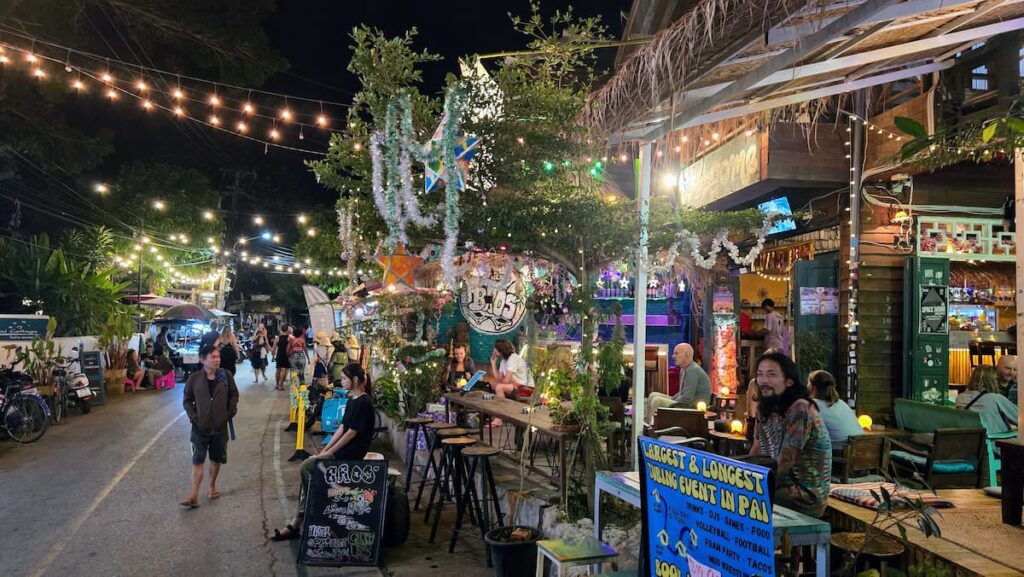
Pai Night Market is a fabulous place to walk through between 18:00 and 22:00 (6 pm – 10 pm) daily. Stalls are filled with fresh food (including great vegan and healthy options), souvenirs, art work, jewelry and the like. This walking street buzzes with tourists and locals trying to get a good deal and a bit to eat. We absolutely loved some of the vegan options including vegan deserts.
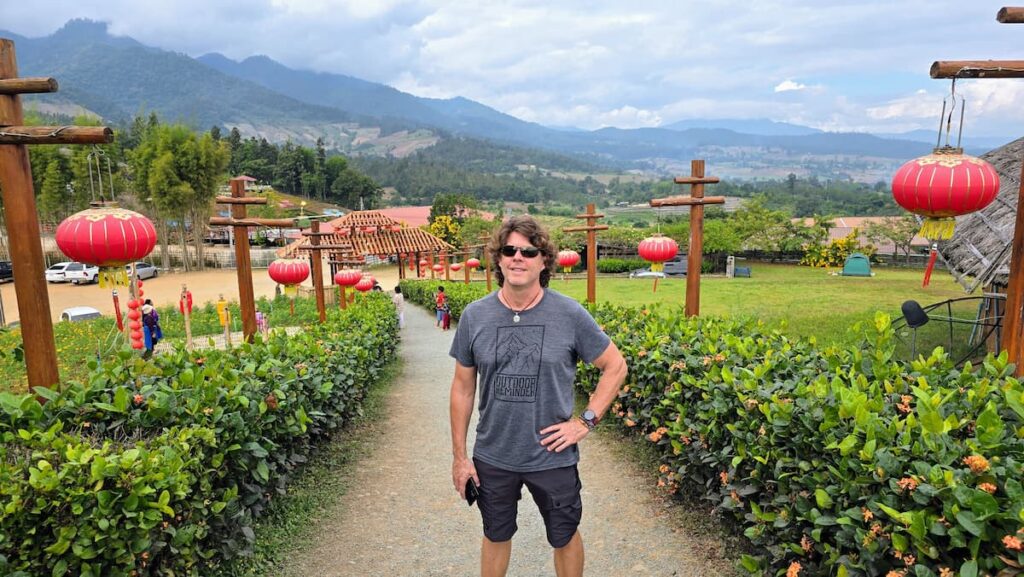
Yun Lai Viewpoint is a nice place to visit if you have transport to get up there. We went up to the viewpoint and grabbed some traditional tea while looking out over the valley. You have to pay 20 Baht ($0.60 USD) to get into the viewing area, but the panoramic views are worth it!
One can also camp in one of the many tents provided. The viewpoint is above the Santichon Village which is mainly a tourist place selling Chinese goods.
Pai Hot Springs:
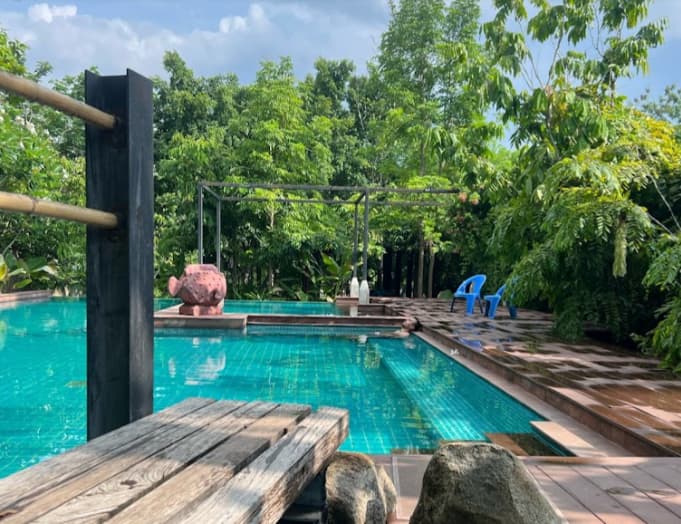
Pai Natural Hot Spring & Well-being Center – a lovely place to spend a few hours. 150 Baht ($4.50 USD) will get you a full day at the pools, a towel, a bottle of water, a shower and a locker for your stuff. There are 3 pools: warm, very warm and hot.
Hours of operation are Monday – Saturday from 11:00 – 19:00 (11 am – 7 pm)
Tha Pai Hot Springs are located 8 km (5 miles) to the south of Pai. These are pools with varying degrees of heat from 36 C (97 F) down to 32 C (90 F) and a cool pool as well. You can purchase eggs to boil in the 80 C (176 F) hot spring as well.
Cost to enter the hot springs is 300 Baht ($9 USD) per person.
Places to Stay in Pai
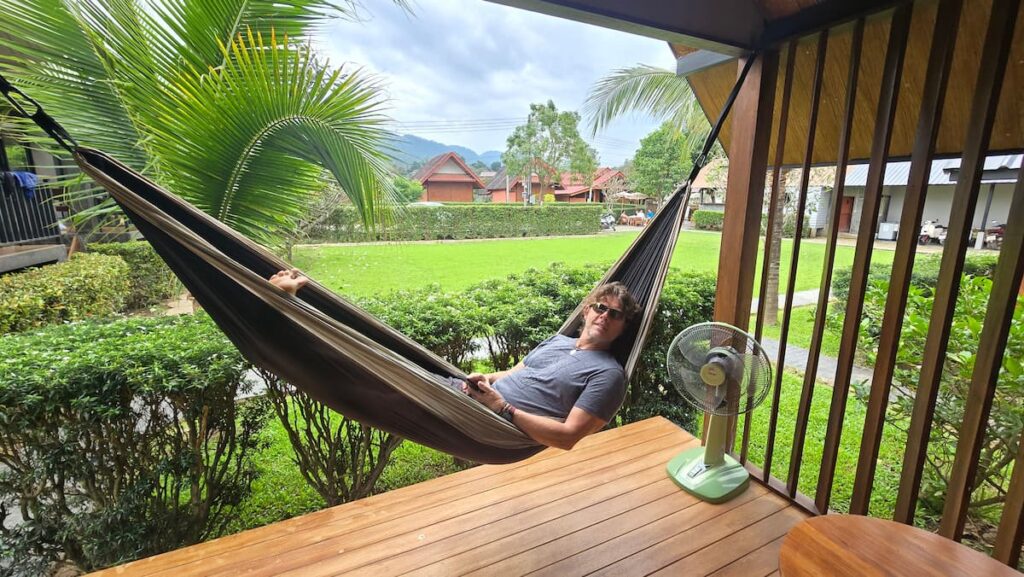
Luxury – Reverie Siam Resort this 4 star resort has 20 unique suites, 2 salt water pools and a nice restaurant. Prices start at $200 USD per night.
Moderate – Pai Nam Now has individual air conditioned huts with a nice porch with a hammock. We loved this place and wished we stayed much longer. Prices start at $66 USD per night.
Budget – UP2U Guesthouse has mixed dorm rooms, a garden and a beautiful terrace. Prices start at $15 USD per night per person.
Places to Eat in Pai
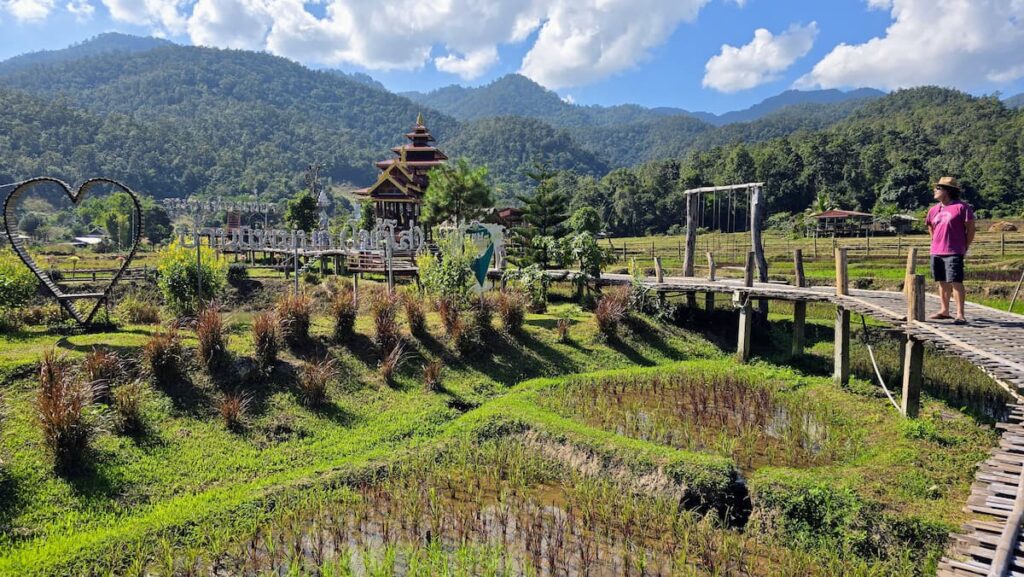
Pai, being a bohemian town has so many lovely cafes, restaurants and coffee shops, it is difficult to just name a few. Of course we had to check out all of the vegan ones first!
Two Huts – this is one of the best places in Pai to see the sunset. Great Thai food, coffee and drinks.
Om Garden Cafe – A popular cafe serving Mediterranean and Asian food served with a Thai twist. Vegetarian and vegan options are available.
Bom Bowls – this is one of the best breakfast places in town serving healthy acai bowls and coffees. And it happens to be vegan, yet also popular with omnivores.
Dammie Cafe – great place for bagels and coffee. A good option for breakfast or lunch.
Ganita Cafe – a vegetarian restaurant with many vegan options. Fabulous food that even omnivores enjoy. Rob and I came back a few times as we loved it so much!
Day 4: Pai to Ban Rak Thai (118 km)
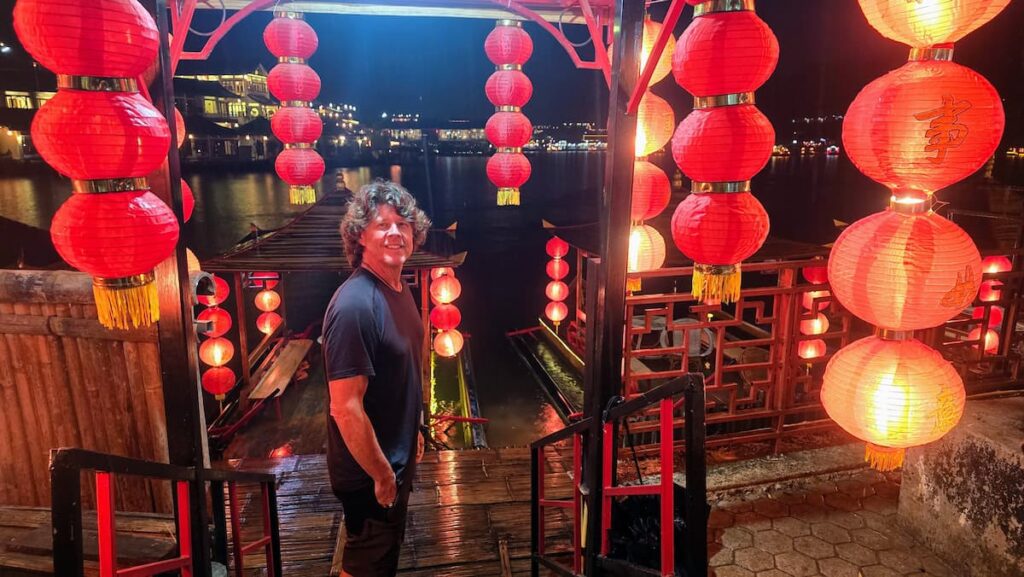
Most Mae Hong Son loop guides only list Ban Rak Thai as a side trip. Yet for us, it was a natural stop to enjoy all the interesting places along the way. Ban Rak Thai is a pretty little touristic village which sits just a kilometer south of the Myanmar border. It can be seen in an hour or so and is a bit kitschy, yet has an interesting past.
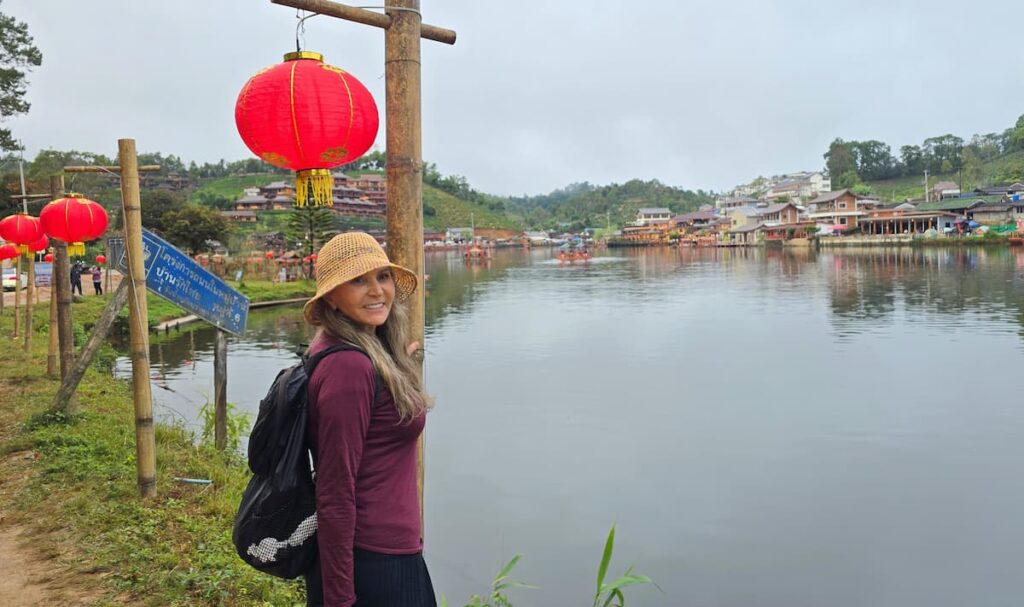
Chinese KMT soldiers who lost to the Communists fled to this part of Thailand and settled there after the Chinese Civil War ended in 1949. Therefore the village has a real Chinese feel to it. The actual town surrounds a lake and then tea plantations surround it. There are a lot of restaurants in the area that are quite underwhelming, so the best thing to do is eat at your hotel. The lake has little boats that one can rent.
On your way from Nam Lod Caves or Pai make sure to stop in the following places:
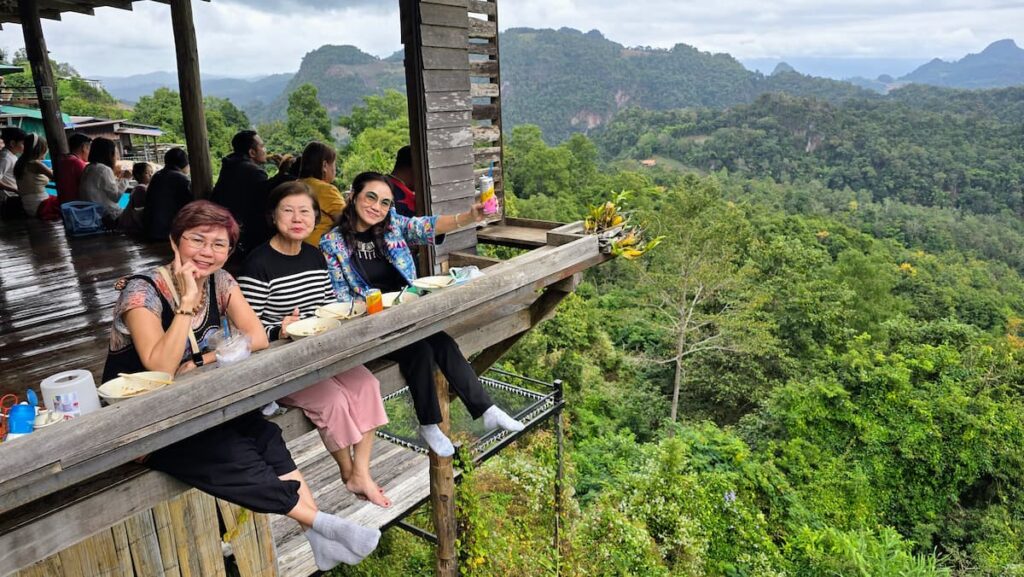
Noodle Soup House Ban Jabo – this 10 minute side trip from the Mae Hong Son loop (1095) takes you to this ultra popular noodle house which has spectacular views and a very limited menu of noodles which folks slurp up while dangling their feet off a cliff. Unfortunately no vegan or vegetarian options are available.
Ban Luk Khao Lam Viewpoint – a lovely scenic spot overlooking the hills and mountains of the Mae Hong Son Loop. There are many vendors here selling fruit and grilled sweet potatoes. We were there on a cool rainy day and the hot purple and orange sweet potatoes totally warmed us up!
Top Things to Do in and Around Ban Rak Thai
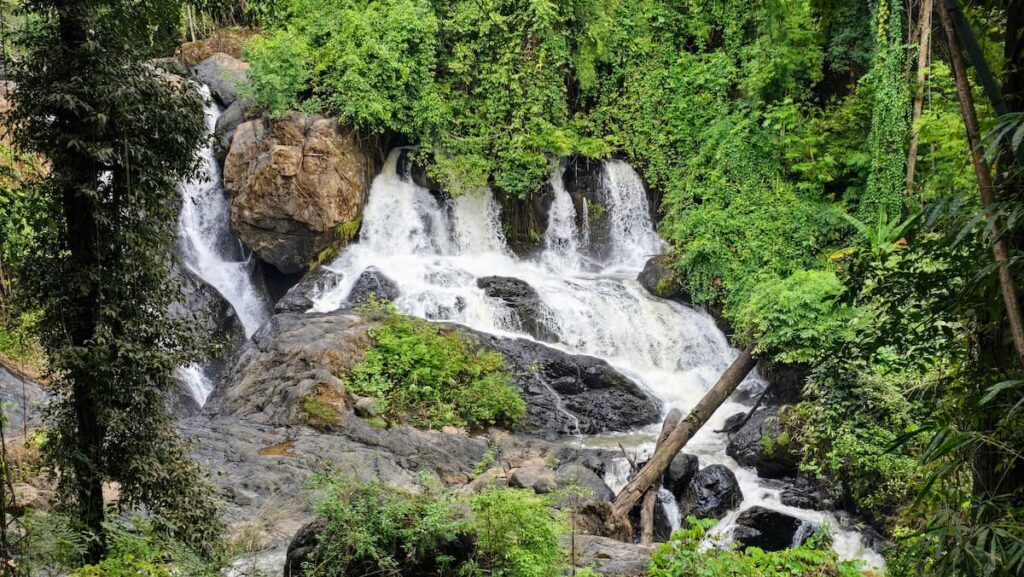
Namtok Pha Suea – Pha Sua Waterfall – this waterfall can be seen from the parking lot. However, a 100 Baht entry fee is required to walk down for a better view. The fee also includes Pang Ung (which is worth visiting) and the Fish Cave at the Tham Pla – Namtok Pha Suea National Park (which we skipped) if visited on the same day.
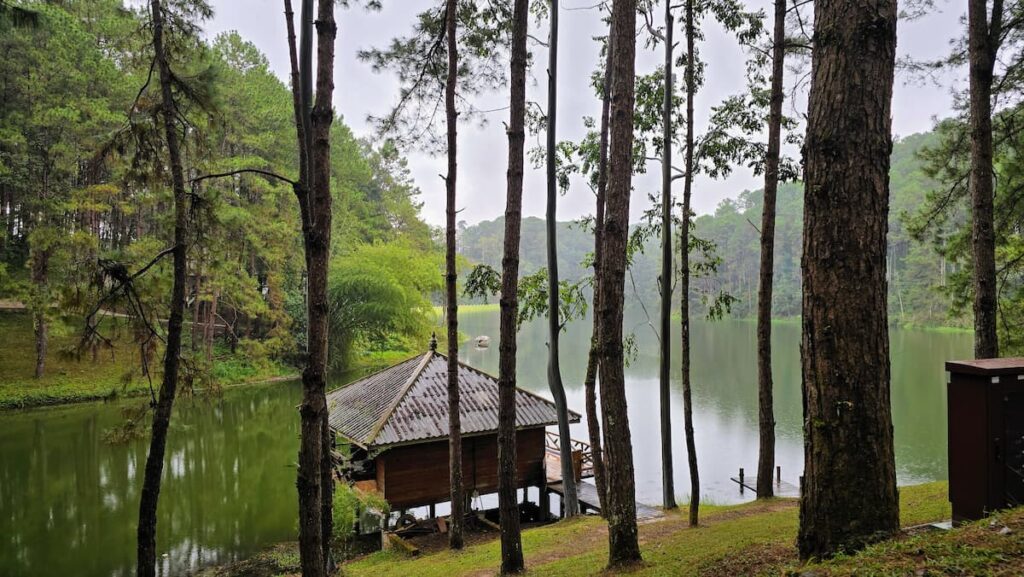
Pang Ung – is a picturesque reservoir with well maintained grounds and pretty flower beds. There are bamboo rafts to go around the lake for a small fee. The water is surrounded by mature woods where camping is available. It is also adjacent to a small town which is a nice option for cheaper accommodations than in Ban Rak Thai proper.
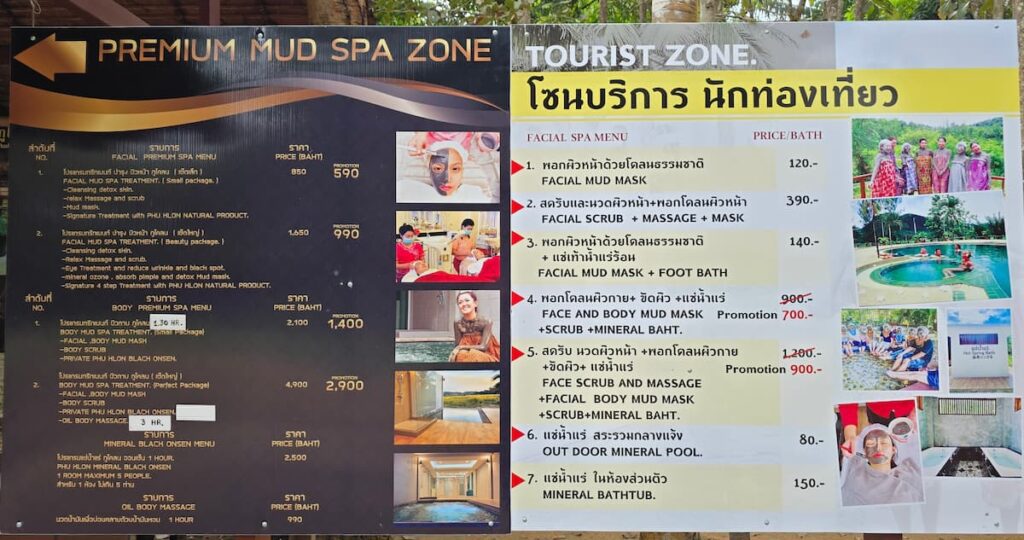
Phu Klon Country Club Health Mud Spa – this mud spa claims to rejuvenate your skin and body with their sulfur spring water. There are 2 sections – the cheaper public one and private pools which overlook rice paddies and green fields. The staff here is fabulous and the water in the pools is hot and relaxing. We highly recommend spending a few hours here.
Places to stay around Ban Rak Thai
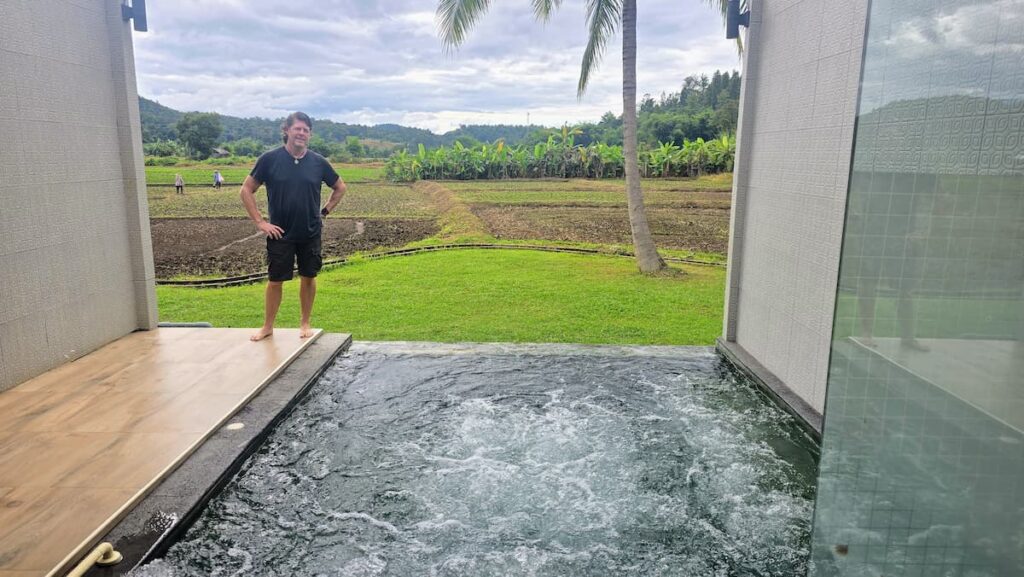
Moderate – Rak Thai Homestay – the best part of this newly renovated property is the view of Ban Rak Thai and the sunsets over the lake. Accommodations are eco-tent structures with queen size beds. Prices start at $59 USD.
Budget – Suan Rai Rungarun – these basic tents have an attached private bathroom and a small patio overlooking the flower fields. Prices start at $38 USD for 2 including a modest breakfast and free WIFI.
Budget – Lung Soi Nguen Homstay Pang Oung – lovely homestay in Pang Ung featuring rooms with queen beds and private bathrooms, flat screen TVs and free WIFI. Prices start at $22 USD for 2 people.
Side Trip to Nam Lod Cave
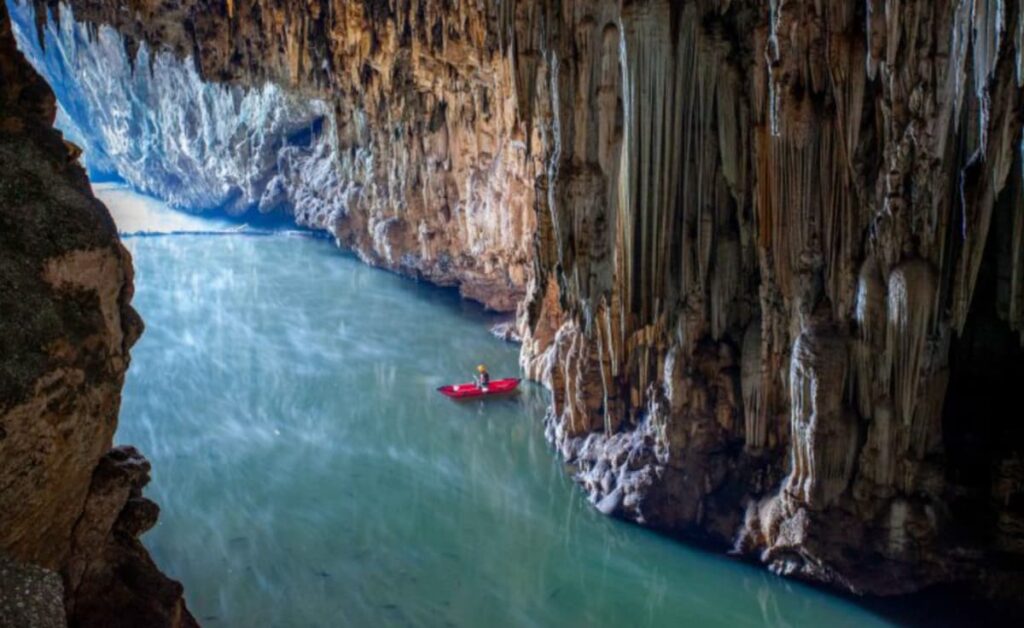
Although the drive from Pai to Tham Nam Lod (the town near) Nam Lod Cave is only 50 km, we truly enjoyed this piece, especially because of the amazing place that we stayed at: the Jungle Guesthouse. Da, the owner of the guesthouse is one of the nicest most beautiful people that we have ever met. Her kindness and spirit will stay with us forever.
Trying to squeeze as much out of Pai as possible we left too late to experience the Nam Lod Cave adventure and ended up staying in Da’s guesthouse. She cooked us one of the freshest and most delicious meals we have ever had. In addition, Da bakes her own bread and also makes home made jams out of local berries.
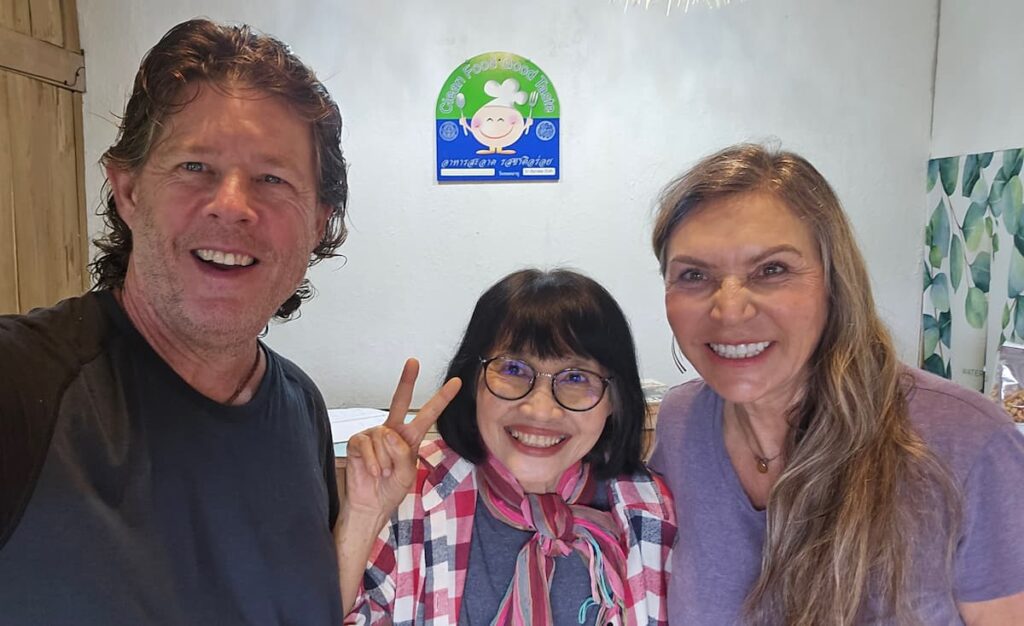
We stayed in one of her beautifully designed and modern huts and hung out by the campfire outside of the shared space talking with her and sharing stories. Honestly, the Jungle Guesthouse was one of the most memorable parts of our Mae Hong Son Loop experience! Therefore we hope that you will have enough time to stay there as well.
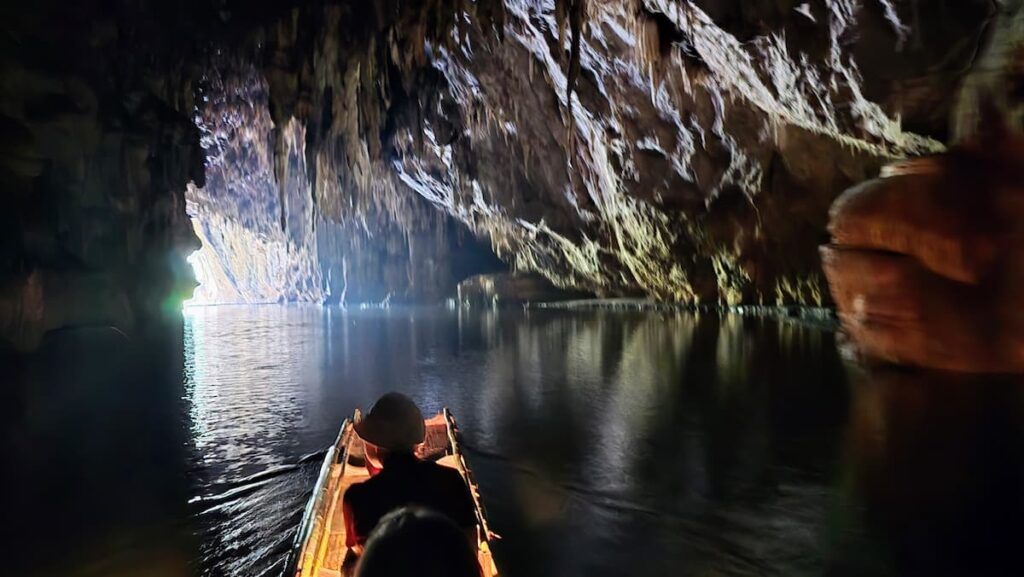
The Nam Lod Cave system is definitely worth the stop as well. We came to the entrance at 10 am and saw very few people there. For 600 Baht ($18 USD) 1-3 people are accompanied by an English speaking guide with a kerosene lamp through 3 of these impressive upper caves. The overall experience takes about 2 -2.5 hours long.
The trek takes you up some pretty steep stairs, so be prepared for some exercise. The last cave includes a trip on a bamboo raft with thousands of fish following the boat, hoping to get some food (which you can buy at the entrance). Our guide has been guiding in these caves for over 40 years and was an absolute delight!
Note, that if you stop at the Jungle Guesthouse, you may want to push on to Mae Hong Son instead of spending the night near Ban Rak Thai.
Day 5: Ban Rak Thai to Mae Hong Son (129 km)
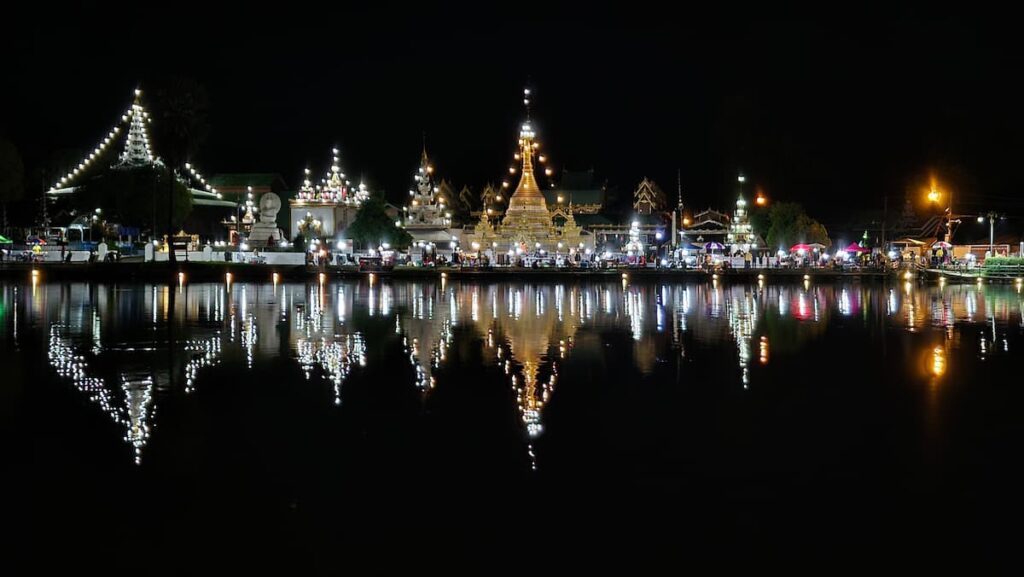
This piece of the Mae Hong Son loop takes you through some more hairpin turns and verdant jungle mountains.
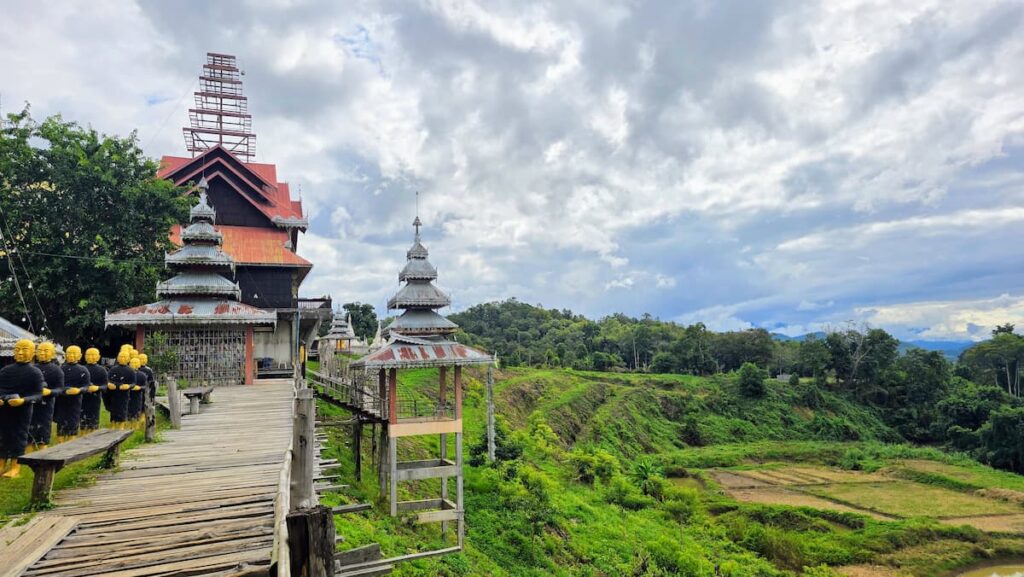
On the way to Mae Hong Son, we recommend that you make a stop at the Su Tong Pae Bridge & Wat Phu Samanaram. Park near the 1095 and walk on foot through many local handicraft vendors stalls. The items here are quite unique and worth a look.
The bridge take you across the rice fields onto the grounds of a Buddhist monastery which has many different and interesting structures and areas to see. The bridge entry is by donation.
Top Things to Do in and Around Mae Hong Son
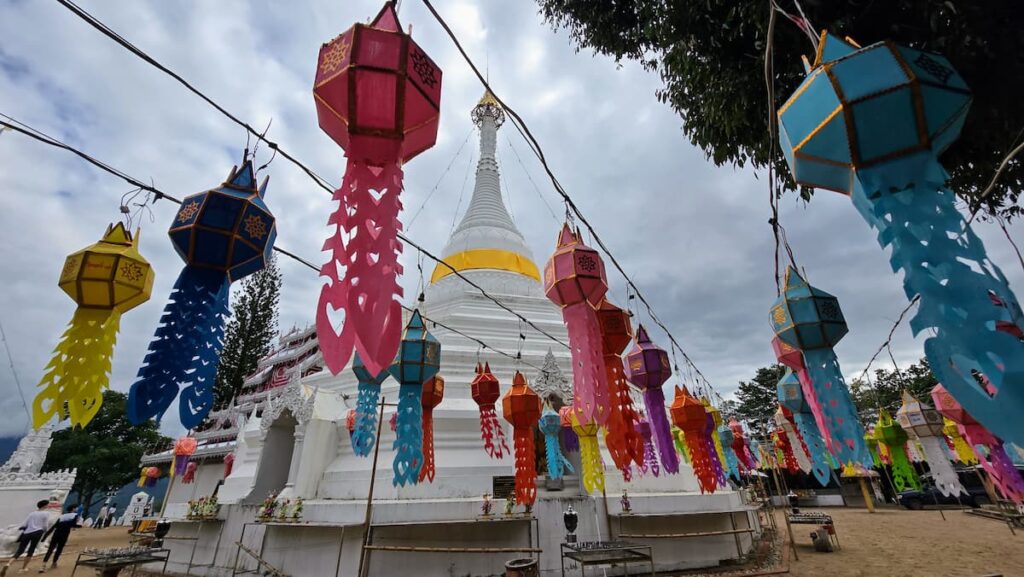
Mae Hong Son is a small town with Chong Kham lake in the middle of it. The place comes alive as the vendors of the Mae Hong Son Night Market set up on the west side of the lake. Food is abundant here and there is even a vegan stall with a few items. For omnivores there are so many different options especially of the Burmese and Thai food varieties!
On the south side of the lake is the beautiful Wat Chong Kham, which reflects on the water for nice pictures during the day and night. One other place not to miss here is:
Wat Phra That Doi Kongmu – this Burmese style Buddhist Temple sits on top of a hill overlooking Mae Hong Son town. It was established in 1860 and has 2 white golden-spired stupa domes & an ornate hall. The best time to come here is either at sunrise or sunset.
Side Trip to a Kayan Village
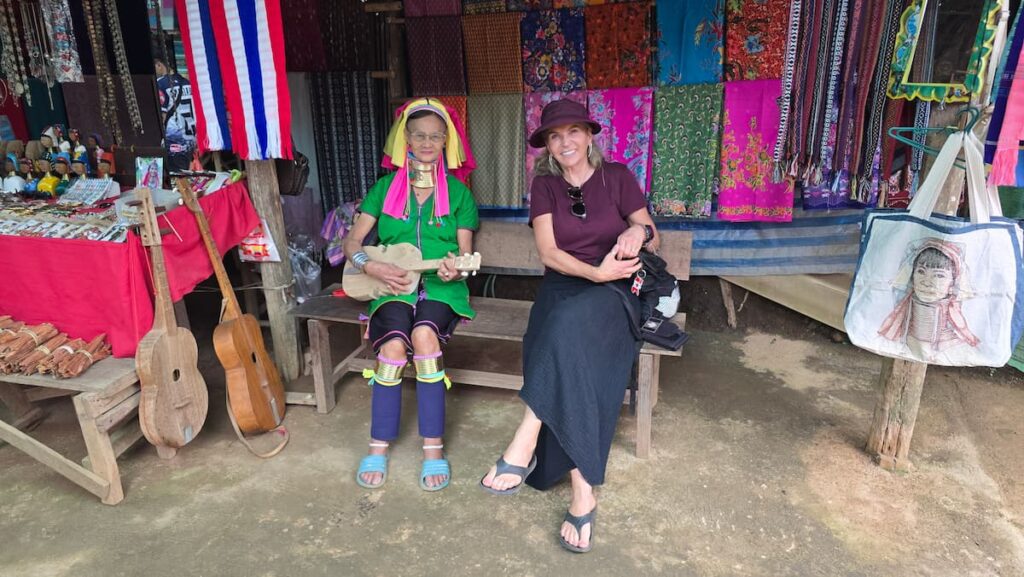
There are also 2 Long Necked Kayan (Karen) villages close to Mae Hong Son. It is up to you if you decide to visit these quite controversial places. For some these are not much more than human zoos while others want to support these people and their craft.
The Kayan Long Neck tribe are a Tibeto-Burmese ethnic group, who originate from Myanmar/Burma, they are not native to Thailand. All of the Kayan Long Neck people who live in Thailand have crossed the border as refugees from Myanmar. Most of them have fled persecution to seek safety and refuge in Thailand.
We decided to visit the Pha Bong Kayan Village and see for ourselves. The village itself is quite pretty and located in the mountains. All tourists are funneled through a payment process of 250 Baht ($7.20 USD) per person. It is said that the money goes to the Kayan people.
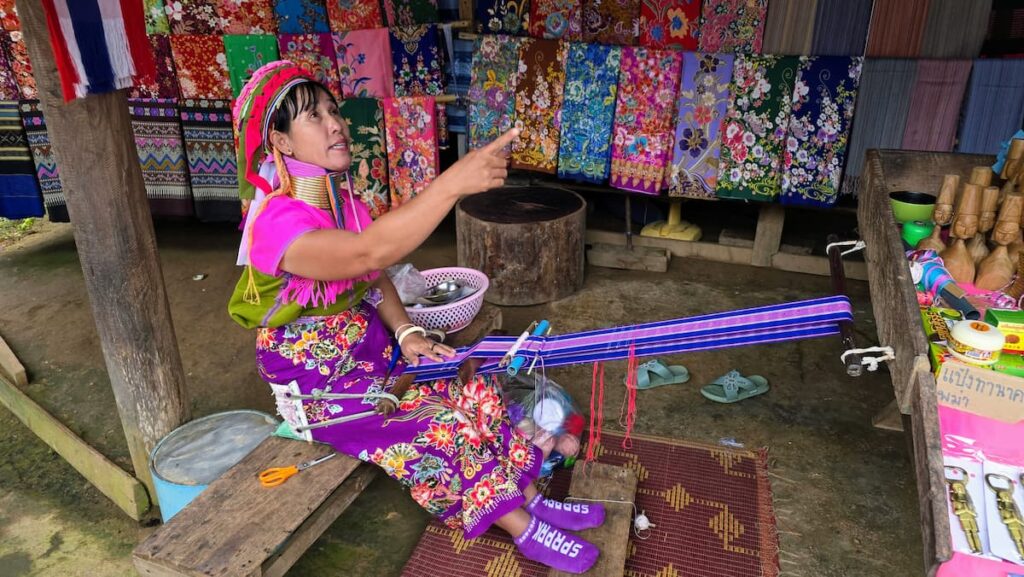
As per one of our rules – we gave money to the women that we spoke with and took photographs with. They were all absolutely lovely.
Our perspective is still mixed – does the entry money go to the Kayan people or does it get funneled somewhere else? We will never know, but the experience was memorable and we did leave some substantial cash for the women – so we felt good about our decision to visit.
Places to Stay in Mae Hong Son
There are quite a few places to stay in Mae Hong Son. Our recommendations are below:
Once inside the paid “village” we walked through some typical souvenir stalls passing by a very cute European looking cafe and crossed a small pretty footbridge. On the other side were Kayan people selling their handmade tapestries, jewelry and the like.
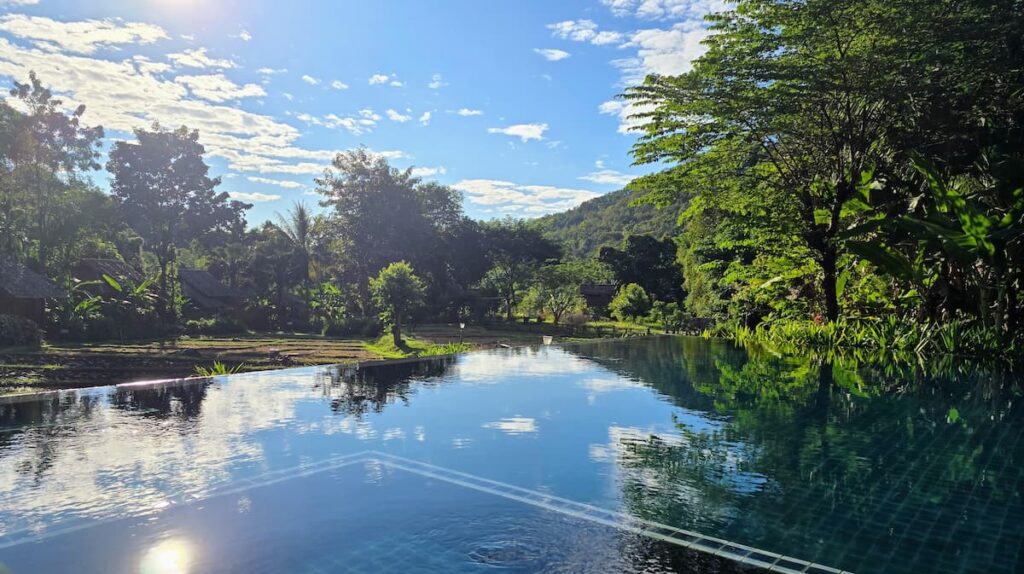
Moderate – Fern Resort – is a lovely place just outside of Mae Hong Son set on quiet rice plantations. The resort is rustic but has nice large rooms with the sound of babbling brooks running throughout the property. There are 2 pools with an infinity pool overlooking rice paddies, which is great for sunsets.
There are also private bungalows (where Angelina Jolie and Brad Pitt once stayed) and a great (and inexpensive) spa with good strong massages. The restaurant on the property is quite good as well. Prices start at $52 for 2 people with breakfast included.
Budget – Sarm Mork Guest House – a budget or twin room offers 2 people an air conditioned room with free WIFI, a flat screen TV and a private bathroom. Prices start at $17 USD for 2 people. Breakfast is an additional $3 USD per person.
Places to Eat in Mae Hong Son
Besides sampling great offerings at the Mae Hong Son night market we can recommend a few of these restaurants:
Salween River Restaurant – a simple eatery with Burmese dishes (for vegetarians try the Burmese tea leaf salad) also offering pasta, pizza and burgers.
Mae Rong Son Restaurant – this simple yet very clean and delicious restaurant which is set in a garden and offers simple Thai dishes at very low prices.
Day 6: Mae Hong Son to Mae Sariang (86 km)
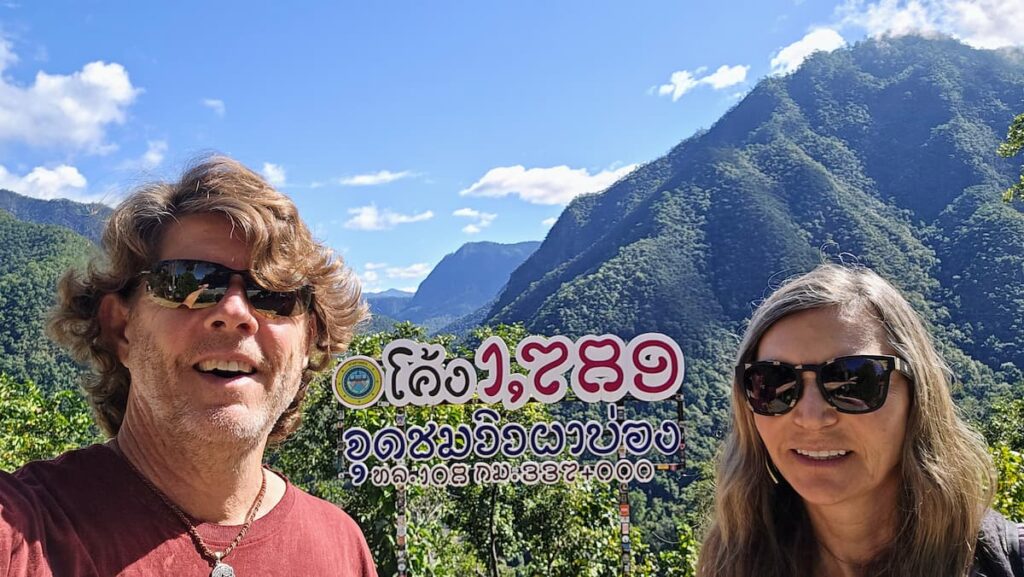
This part of the Mae Hong Son loop is very verdant but has less switchbacks and is a little easier on the stomach. Along the way here are a few places that we recommend stopping at:
One of the most beautiful viewpoints on the Mae Hong Son loop is the Pha Bong Viewpoint which is unmissable as you will see tons of scooters and cars parked on the side of the mountain here.
In Khun Yuam there is a lovely cafe called Dad’s Garden located on nice fields that has fresh food (including vegetarian and vegan options) that we can highly recommend.
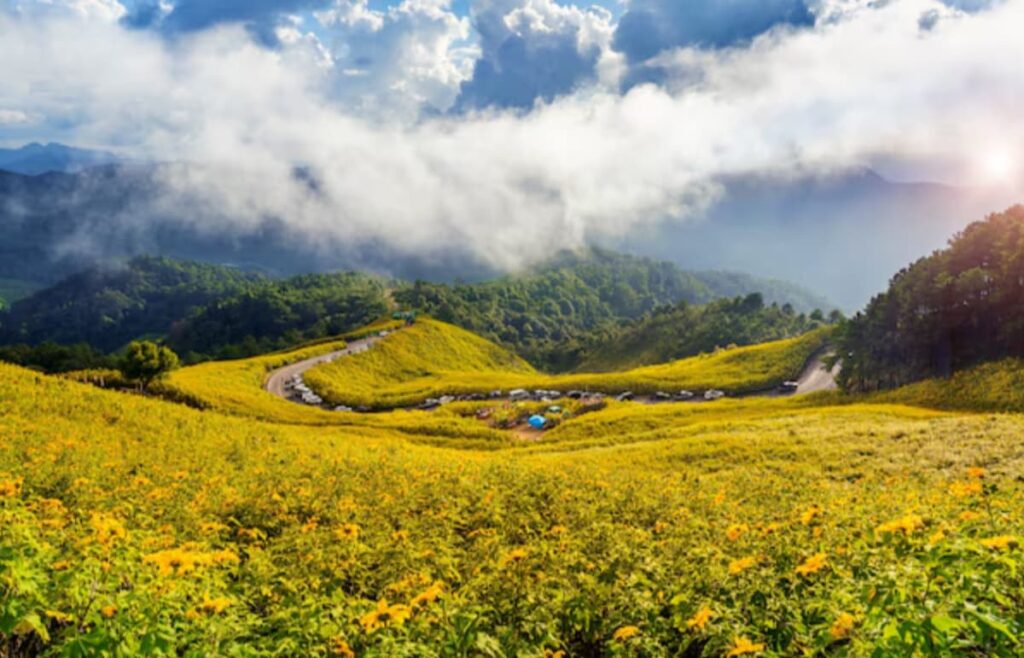
In addition, you may also want to make a 27 km detour (one way) from the small town of Khun Yuam, on the Mae Hong Son loop to see Thung Bua Tong Fields at Doi Mae U Kho. These stunning fields of Mexican sunflowers bloom between mid November through early December. So, if you are there during this time, consider making this stop.
Top Things to do in Mae Sariang
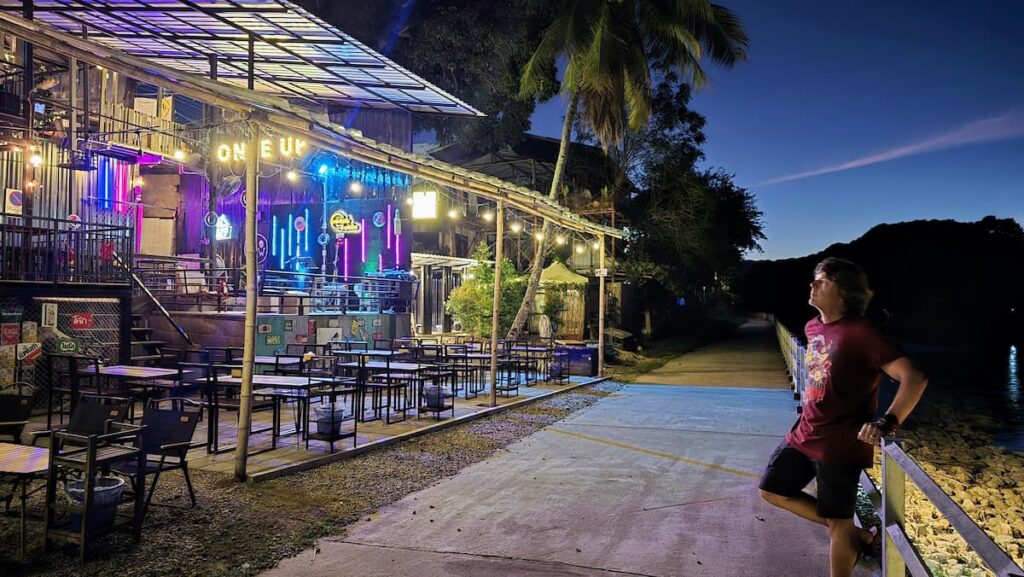
Mae Sariang is a sleepy river town with a few nice Burmese Buddhist temples and a focus on great coffee. Both Wat Phrathat Chom Mon and Wat Jong Soong are worth a visit.
Wat Chom Thong is located a few minutes south of town and has a large golden seated Buddha overlooking rice fields and mountains – which we thought was worth the short drive.
However our favorite thing to do here was walk along the river bank during the day and evening, as there is a nice river pedestrian walkway there with many nice cafes, restaurants and bars making it a pleasant place to unwind.
Places to Stay in Mae Sariang
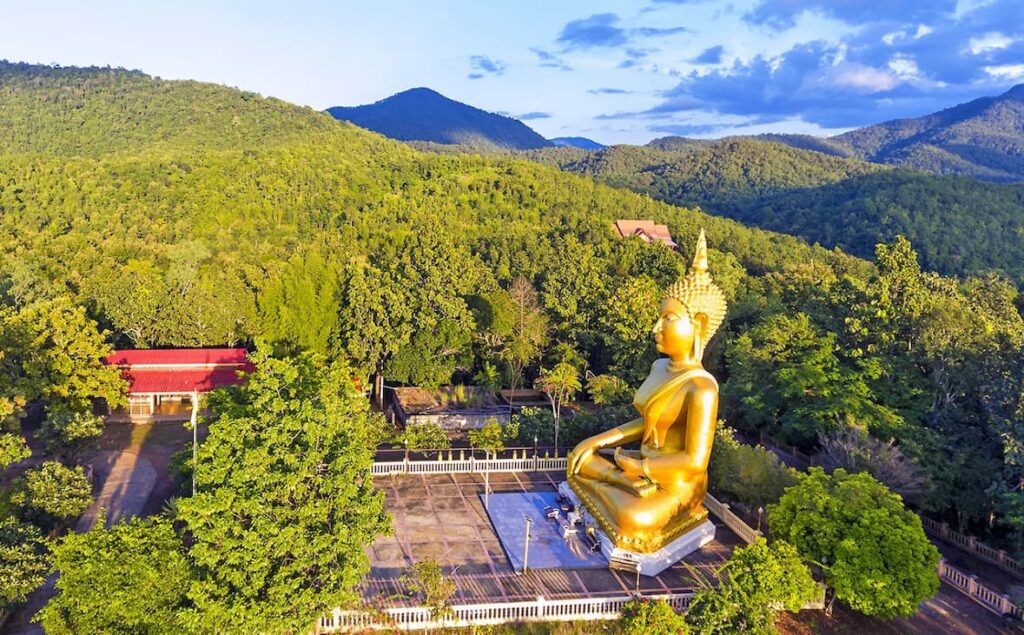
There are numerous guesthouses and hotels located along the river and near the rice fields. Here are some of our favorites:
Moderate – Riverhouse Resort A “resort” of a 2 star kind, however is very clean and has great views of the river in a quiet section of town. A twin room with a balcony has air conditioning, free WIFI and a private bathroom starting at $44 USD for 2 people with breakfast.
Budget – Mae-Sa-Riang Home A Standard Twin room with a mountain view which includes free WIFI, a microwave, fridge, kettle and a shared bathroom starts at $15 USD for 2 people. There is a nice terrace and breakfast can be purchased at $2 USD per person.
Budget -Chill House A clean hotel in the middle of rice fields. Rooms have air conditioning, flat screen TVS and private bathrooms with gorgeous views of the green fields (if you are there at the right time). Rooms for 2 start at $20 USD without breakfast.
Places to Eat in Mae Sariang
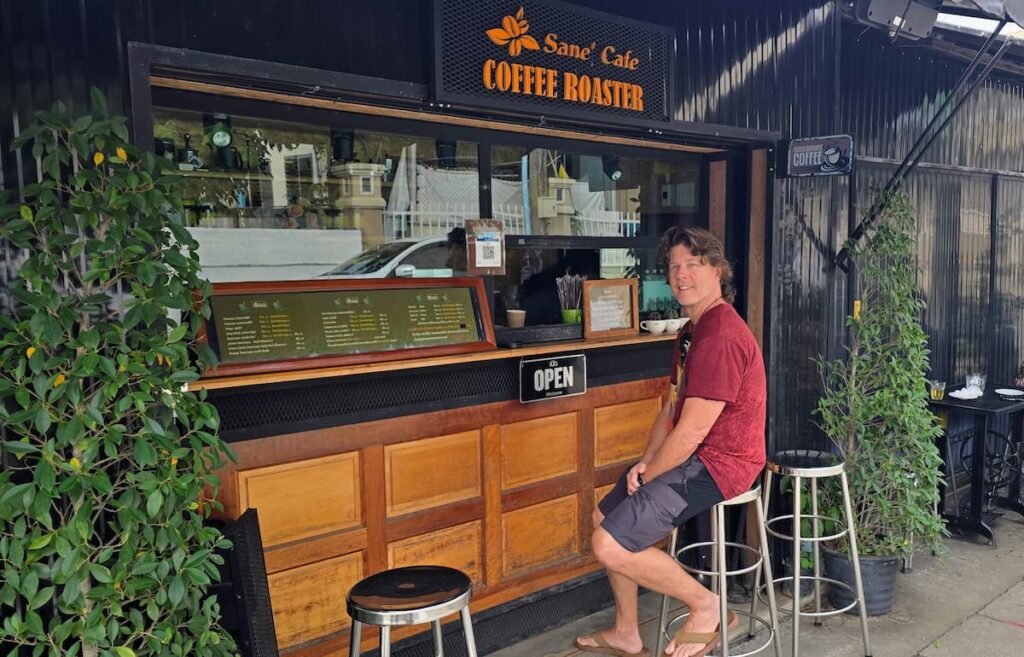
There are many options available, especially on the river with lovely views. Here were some of our favorites:
Sawadee Cafe & Bar has both Thai dishes as well as western fare (like the recommended burgers) with a great river view. The prices are very affordable and the beer is cold.
Inthira Restaurant has Thai food in a nice clean setting. Recommended dishes are the Vegetable Soup with coconut milk, Cashew Chicken, Red Curry Chicken and Red Curry Vegetable. They offer vegetarian options as well.
Sook Coffee Mae Sariang has wonderful coffee. However, what I fell in love with was the Kombucha! There are many homemade options. This place also has a farm stay.
Sane Cafe Coffee Roasters has some of the best coffee in town! There is usually a line up of locals, but well worth it.
Day 7: Mae Sariang back to Chiang Mai (197 km)
This next section of the 108 highway is much flatter and easier to travel through than previous sections. Depending on traffic and where specifically you are returning to, it should take you between 3.5 hours to 4.5 hours to get back.
Side Trip to Doi Inthanon National Park
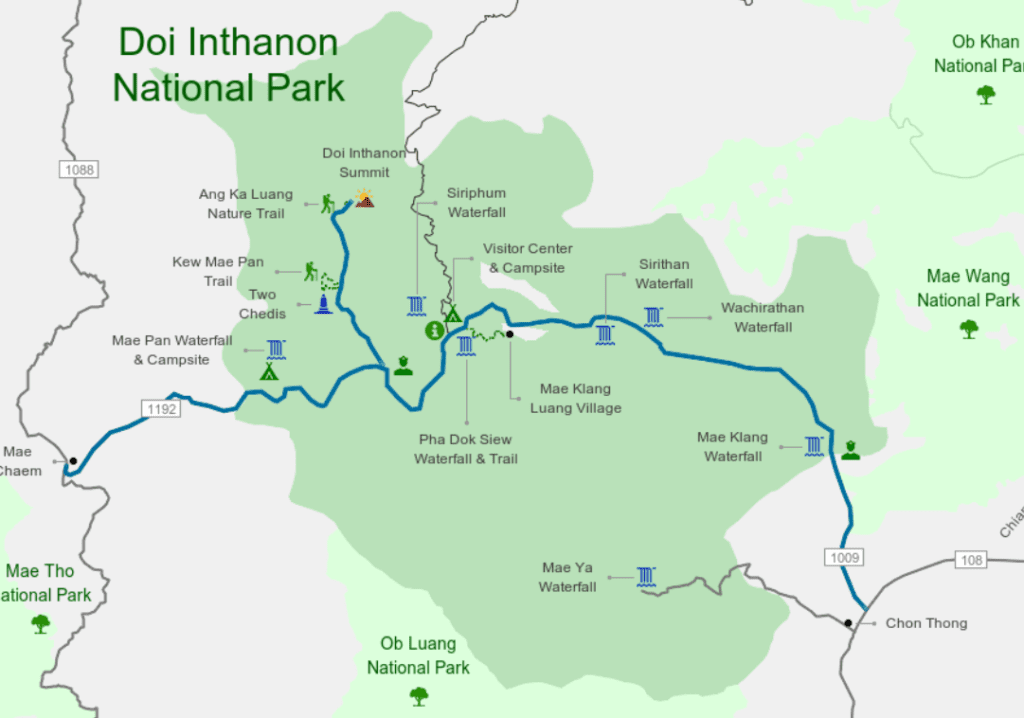
If you have extra time, consider a detour from the Mae Hong Son loop to visit Thailand’s highest peak. This park is famous for its twin stupas dedicated to the late King and Queen, lush waterfalls such as Wachirathan and Mae Ya, and hiking trails that range from easy walks to more challenging treks.
This trip can also be done from Chiang Mai. We can’t wait to come back to hike and camp through this park!
Wrap Up – The Mae Hong Son Loop
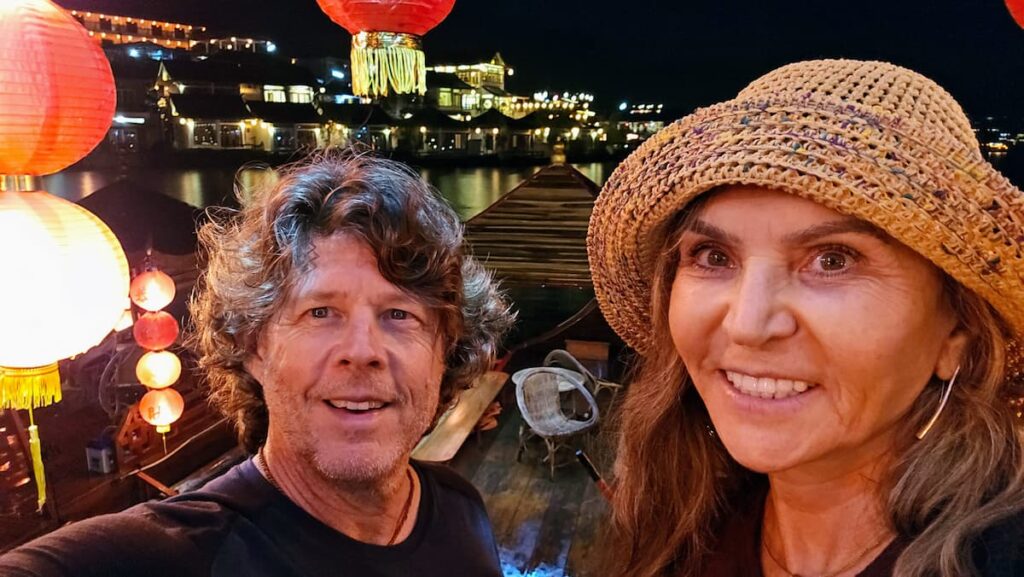
Our 7 day Mae Hong Son loop trip was nothing short of magical. We so wished that we stayed longer in Pai, had time to camp in Pang Ung and had more time to trek and explore the Doi Inthanon National Park. All of these are definitely on the list for our next trip back to stunning and diverse Northern Thailand!
Have you traveled on the Mae Hong Son loop? What was your favorite destination? We would love to hear from you in the comments so that we can make our next Mae Hong Son loop even more spectacular.

